2015新外研版英语八年级下册M7U1
外研版八年级英语下册教案 M7 U 1 (1)

so she can wear shorts and light trousers there. Lingling hasn’t got any sunglasses, but she can buy a pair there.
1)特殊疑问词+不定式
嗯,听起来很荒唐,但是我真不知道该带什么东西。(课本原句)
你能告诉我如何到达那儿吗?
你知道如何使用计算机吗?
我忘记如何拼写这个单词了。
他们不能决定去什么地方。
2)had better (not) do sth.
你最好问问旅行社关于行李总重量的事(课本原句)
你最好不要在正月里理发。
2)When are you leaving and how long are you going to stay there?
3)I’m leaving at the end of July and I’m going to stay there for four weeks.
4)Shorts are good, or you can wear light trousers.
学习
目标
通过本课时学习,学生能够:
1.找出对话中的并列复合句,总结它们的用法并能用它们造句。
2.通过朗读训练和造句训练,准确运用三个知识点(what to take;had better (not) do sth.;send sb. sth.)造句。
3.通过反复跟读,能够使用正确的语音语调,连贯流畅地朗读对话。
外研版八年级下册英语M7U1教学课件3
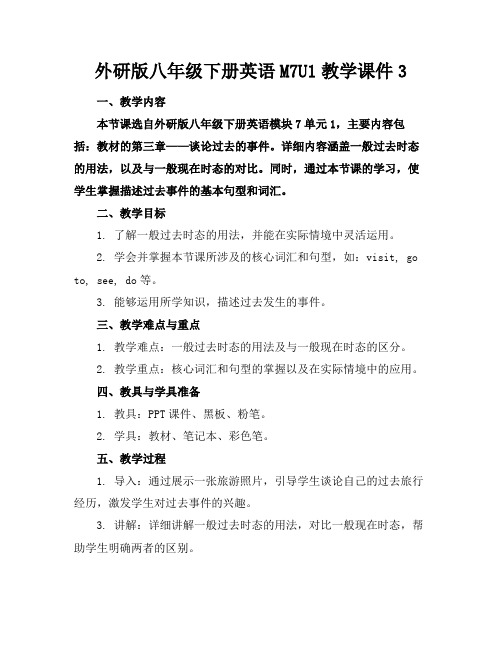
外研版八年级下册英语M7U1教学课件3一、教学内容本节课选自外研版八年级下册英语模块7单元1,主要内容包括:教材的第三章——谈论过去的事件。
详细内容涵盖一般过去时态的用法,以及与一般现在时态的对比。
同时,通过本节课的学习,使学生掌握描述过去事件的基本句型和词汇。
二、教学目标1. 了解一般过去时态的用法,并能在实际情境中灵活运用。
2. 学会并掌握本节课所涉及的核心词汇和句型,如:visit, go to, see, do等。
3. 能够运用所学知识,描述过去发生的事件。
三、教学难点与重点1. 教学难点:一般过去时态的用法及与一般现在时态的区分。
2. 教学重点:核心词汇和句型的掌握以及在实际情境中的应用。
四、教具与学具准备1. 教具:PPT课件、黑板、粉笔。
2. 学具:教材、笔记本、彩色笔。
五、教学过程1. 导入:通过展示一张旅游照片,引导学生谈论自己的过去旅行经历,激发学生对过去事件的兴趣。
3. 讲解:详细讲解一般过去时态的用法,对比一般现在时态,帮助学生明确两者的区别。
4. 实践:进行小组活动,让学生用一般过去时态描述自己的过去旅行经历,巩固所学知识。
5. 例题讲解:选取典型例题,讲解解题思路,引导学生正确运用一般过去时态。
6. 随堂练习:设计相关练习题,让学生当堂巩固所学知识。
六、板书设计1. 一般过去时态的标志词:yesterday, last week, two days ago等。
2. 核心词汇:visit, go to, see, do等。
3. 句型:What did you do last weekend? I visited my grandparents.七、作业设计1. 作业题目:请用一般过去时态描述你上周六的活动。
2. 答案示例:Last Saturday, I visited the zoo. I saw many animals, such as elephants, tigers and monkeys. I also took many pictures.八、课后反思及拓展延伸1. 课后反思:本节课学生对一般过去时态的掌握情况较好,但仍有个别学生容易混淆时态。
新外研版八年级下册M7-Summer-in-Los-Angeles
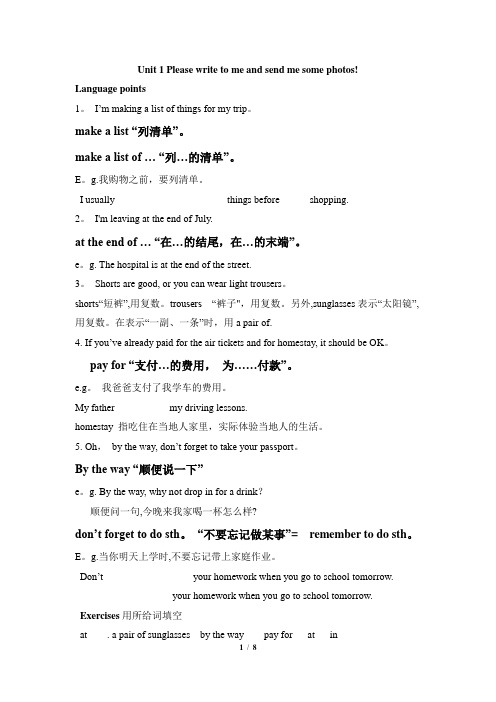
Unit 1 Please write to me and send me some photos!Language points1。
I’m making a list of things for my trip。
make a list “列清单”。
make a list of … “列…的清单”。
E。
g.我购物之前,要列清单。
I usually _____ _____ _____ _____ things before _____ shopping.2。
I'm leaving at the end of July.at the end of … “在…的结尾,在…的末端”。
e。
g. The hospital is at the end of the street.3。
Shorts are good, or you can wear light trousers。
shorts“短裤”,用复数。
trousers “裤子",用复数。
另外,sunglasses表示“太阳镜”,用复数。
在表示“一副、一条”时,用a pair of.4. If you’ve already paid for the air tickets and for homestay, it should be OK。
pay for “支付…的费用,为……付款”。
e.g。
我爸爸支付了我学车的费用。
My father_____ _____ my driving lessons.homestay 指吃住在当地人家里,实际体验当地人的生活。
5. Oh,by the way, don’t forget to take your passport。
By the way “顺便说一下”e。
g. By the way, why not drop in for a drink?顺便问一句,今晚来我家喝一杯怎么样?don’t forget to do sth。
外研版八年级下册英语M7U1教学课件3

外研版八年级下册英语M7U1教学课件3一、教学内容本节课选自外研版八年级下册英语Module 7 Unit 1,主要内容包括:教材的第三章——谈论过去发生的事情。
详细内容涉及一般过去时的用法,以及与一般现在时、一般将来时的区别。
同时,通过课文学习,让学生掌握描述过去事件的句子结构和常用词汇。
二、教学目标1. 能够正确运用一般过去时描述过去发生的事情。
2. 学会使用一般现在时、一般将来时与一般过去时进行对比,了解它们在句子中的运用。
3. 掌握课文中的重点词汇和句型,并能运用到实际情景中进行交流。
三、教学难点与重点1. 教学难点:一般过去时的句子结构和用法。
2. 教学重点:课文中的重点词汇和句型,以及在实际情景中的应用。
四、教具与学具准备1. 教具:PPT课件、黑板、粉笔。
2. 学具:教材、练习本、彩色笔。
五、教学过程1. 实践情景引入(5分钟)利用PPT展示一组图片,图片内容为同学们熟悉的校园生活场景。
引导学生用英语描述图片中的内容,复习一般现在时和一般将来时。
2. 课文学习(10分钟)学生自主阅读课文,理解课文大意。
教师针对课文中的重点词汇和句型进行讲解,让学生跟读、模仿。
3. 例题讲解(15分钟)结合课文内容,讲解一般过去时的用法,并通过例句进行演示。
4. 随堂练习(10分钟)学生完成PPT上的随堂练习,巩固所学知识。
5. 小组讨论(5分钟)学生分成小组,运用一般过去时描述自己过去发生的一件事情。
6. 汇报展示(10分钟)各小组选取一名代表进行汇报,教师点评并给予鼓励。
教师带领学生回顾本节课所学内容,强调一般过去时的用法。
六、板书设计1. 一般过去时的句子结构:主语 + 动词过去式 + 其他2. 重点词汇:yestarday, last week, two days ago,went, visited, played,3. 句型:What did you do ?I七、作业设计1. 作业题目:a. We _____ (go) to the Great Wall last week.b. They _____ (play) football after school yesterday.(2) 小作文:用一般过去时描述你上周六的一天。
2015新外研版英语八年级下册M7U1
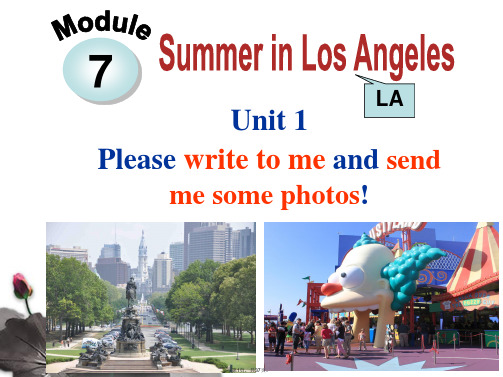
第26页,共37页。
crazy list passport shorts total trousers weigh weight
When you are planning a trip, make a (1) _l_is_t_ of things to take. Do not go (2) __c_r_a_z_y and take too many clothes. For warm countries you can keep cool with (3) __s_h_o_r_ts and some light(4) _t_ro_u_s_e_r_s .
总的,全部 的
weight n. 重量
total weight 总重量 had better 最好
passport n. 护照
make a list 列清单
If you travel to LA, you'd better make a list of the things you take.
第11页,共37页。
第6页,共37页。
What will you take for a trip?
clothes and money
第7页,共37页。
passport
n. 护照
What must you take if you go to
another country?
第8页,共37页。
list n. 名单; 清单
Betty: You should take notebooks, pens and a dictionary.
第15页,共37页。
Lingling: OK. What clothes should I take to LA?
新外研版英语八年级下册M7U1优质课件

新外研版英语八年级下册M7U1优质课件一、教学内容本节课我们将学习新外研版英语八年级下册Module 7 Unit 1《In the future》的内容。
具体章节为:Section 1, 2, 3。
通过本节课的学习,学生将了解并掌握关于未来科技、生活等方面的词汇和表达方式。
二、教学目标1. 学生能够听懂、会说、会读、会写与未来科技、生活相关的词汇和表达方式。
2. 学生能够理解课文内容,把握文章结构,提高阅读能力。
3. 学生能够运用所学知识进行口头和书面表达,对未来进行预测和设想。
三、教学难点与重点1. 教学难点:词汇的准确运用和句型的熟练掌握。
2. 教学重点:阅读策略的培养和口头、书面表达能力的提高。
四、教具与学具准备1. 教具:多媒体课件、黑板、粉笔。
2. 学具:课本、练习本、彩色笔。
五、教学过程1. 导入:通过展示一组未来科技发展的图片,引导学生谈论对未来科技的期待和设想。
2. 新课内容呈现:a. Section 1:学习词汇和表达方式,了解未来科技的发展。
b. Section 2:阅读课文,掌握文章结构和主要内容。
c. Section 3:学习如何用一般将来时进行预测和表达。
3. 实践情景引入:分组讨论,让学生设想未来的学校、家庭、交通工具等,并进行口头汇报。
4. 例题讲解:针对一般将来时的用法进行讲解和练习。
5. 随堂练习:完成课本上的练习题,巩固所学知识。
六、板书设计1. 词汇:future, technology, prediction, robot, solar energy, electric car, etc.2. 句型:I think/expect/believe thatIn the future,Will there be?七、作业设计1. 作业题目:a. 根据课文内容,完成一篇关于未来科技的短文。
b. 用一般将来时,写一段话描述你对未来学校的设想。
2. 答案:见附件。
2015春 外研社 英语 八年级下M7 U1课文Please write to me and send me some photos!(中英文)
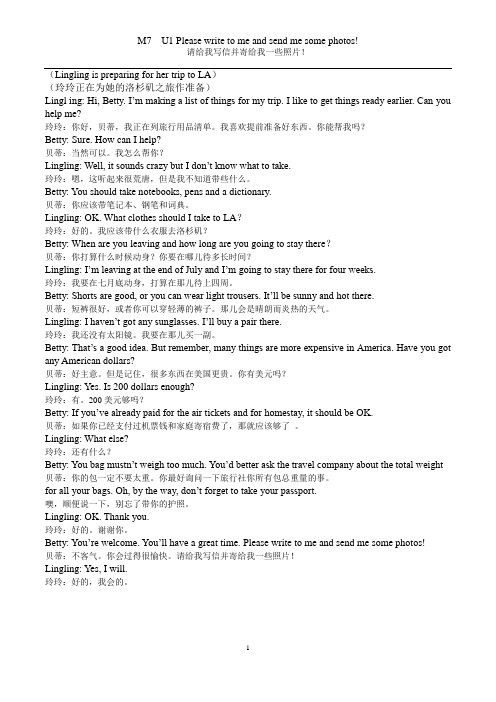
M7 U1 Please write to me and send me some photos!请给我写信并寄给我一些照片!(Lingling is preparing for her trip to LA)(玲玲正在为她的洛杉矶之旅作准备)Lingl ing: Hi, Betty. I’m making a list of things for my trip. I like to get things ready earlier. Can you help me?玲玲:你好,贝蒂,我正在列旅行用品清单。
我喜欢提前准备好东西。
你能帮我吗?Betty: Sure. How can I help?贝蒂:当然可以。
我怎么帮你?Lingling: Well, it sounds crazy but I don’t know what to take.玲玲:嗯,这听起来很荒唐,但是我不知道带些什么。
Betty: You should take notebooks, pens and a dictionary.贝蒂:你应该带笔记本、钢笔和词典。
Lingling: OK. What clothes should I take to LA?玲玲:好的。
我应该带什么衣服去洛杉矶?Betty: When are you leaving and how long are you going to stay there?贝蒂:你打算什么时候动身?你要在哪儿待多长时间?Lingling: I’m leaving at the end of July and I’m going to stay there for four weeks.玲玲:我要在七月底动身,打算在那儿待上四周。
Betty: Shorts are good, or you can wear light trousers. It’ll be sunny and hot there.贝蒂:短裤很好,或者你可以穿轻薄的裤子。
外研版新八年级英语下册M7-U1
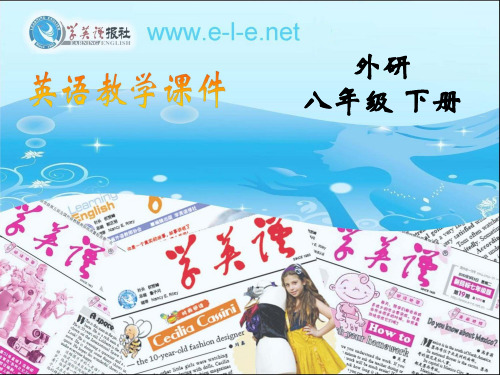
If you travel by plane, your bag cannot weigh too much. For some flights, (5) _______ total twenty kilos may be the (6) _______ you can take. To make sure, ask the travel company for help. Remember to check the (7) _______ weight of your bag. And finally, the most important thing: do passport not forget to take your (8) ________.
1. What clothes should I take to LA? 2. I haven’t got any sunglasses. I’ll buy a pair there. 3. Many things are more expensive in America.
Now listen again and repeat.
Thailand
America
Some ideal destinations
Hong Kong
England
Do you know Los Angeles? How much do you know about it?
Now enjoy a video to see what the mayor of LA want you to know about the city.
2. If you’re already paid for the air tickets and for homestay, it should be OK. 如果你已经付过机票钱和家庭寄宿费了, 那就应该够了。
外研版八下英语M7U1
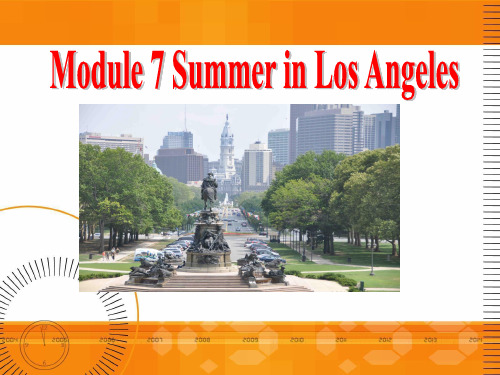
list n. 名单; 清单
shorts n. 短裤
crazy adj. 发疯的,荒唐的
trousers n. 裤子
sunglasses n. 太阳镜,墨镜 weigh v. 重 量有……, 重……
total adj. 总的, 全部的
weight n. 重量
passport n. 护照
Lead in
4 T-shirts 7 passport √ 5 pens √ 8 sunglasses 6 a dictionary√ 9 notebooks √
读完后找出Betty建议Lingling在旅行时所带的物品。然后小组内核对 答案,最后找小组的代表说出答案。
Contents:
I. Find sentences in the conversation which contains but, and, or compound sentences. 1.It sounds crazy,but I don’t know what to take. 2.When are you leaving and how long are you going to stay there? 3.I’m leaving at the end of July and I’m going to stay there for four weeks. 4.Shorts are good or you can wear light trousers. II. Find sentences in the conversation which suggest that... 1. Ling ling wants help. Can you help me? 2. Betty is glad to offer help. How can I help? 3. Lingling asks for more help. What else? 4. Betty tells Lingling to remember something important. Oh, by the way, don’t forget to take your passport.
外研版八年级英语下册教案 M7 U 1 (2)

准确写出词汇和做出判断;流畅地交谈
3.通过问题链、追问,学生结合自己的实际回答计划的问题(指向目标3、4)
从文本中找出正确语句并说出;较为流畅地表达自己的想法
4.根据提示简要说出对话内容(指向目标3)
较为准确、流畅地说出
教学过程
2.根据图片用简单的语言描述自己的计划;
读3.能从简单的文章中找出有关信息,理解大意;
4.能根据上下文猜测生词的意思。
课标分解
1.能通过听对话,选择或说出对话的主题、记录谈论计划的关键信息;
2.能通过阅读对话,找出对话中的具体时间、地点、相关物品等信息;能选出或说出对话的主要内容;
3.能在语境中猜出生词的意思,不妨碍听和阅读的理解。
学习策略:经过一年半的听力训练,大多数学生已经掌握了捕捉关键词、关键句的听力技巧,但猜测词义和克服生词障碍的能力需加强。
学习
目标
通过本课时学习,学生能够:
1.在语境中猜测意思并认读下列词汇:make a list, it sounds crazy, at the end of..., shorts, light trousers, a pair of sunglasses, weight too much, the total weight, by the way, take your passport, have a great time, write to me, send me some photo...
They will stay for about ______ _______.
How many students there are in the group and who will they stay with?
M7U1外研版八下英语课件
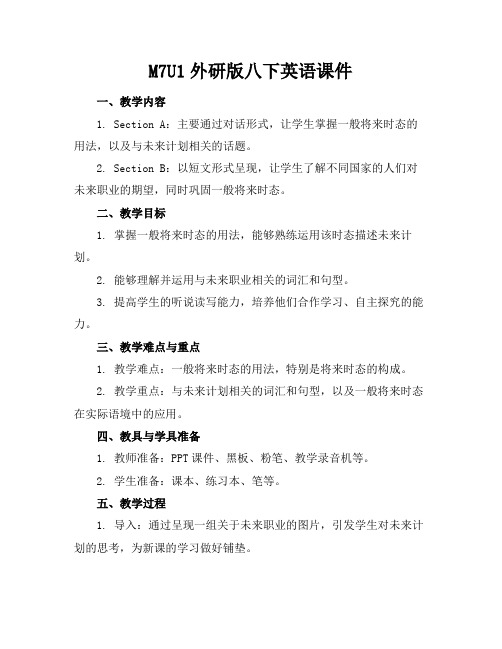
M7U1外研版八下英语课件一、教学内容1. Section A:主要通过对话形式,让学生掌握一般将来时态的用法,以及与未来计划相关的话题。
2. Section B:以短文形式呈现,让学生了解不同国家的人们对未来职业的期望,同时巩固一般将来时态。
二、教学目标1. 掌握一般将来时态的用法,能够熟练运用该时态描述未来计划。
2. 能够理解并运用与未来职业相关的词汇和句型。
3. 提高学生的听说读写能力,培养他们合作学习、自主探究的能力。
三、教学难点与重点1. 教学难点:一般将来时态的用法,特别是将来时态的构成。
2. 教学重点:与未来计划相关的词汇和句型,以及一般将来时态在实际语境中的应用。
四、教具与学具准备1. 教师准备:PPT课件、黑板、粉笔、教学录音机等。
2. 学生准备:课本、练习本、笔等。
五、教学过程1. 导入:通过呈现一组关于未来职业的图片,引发学生对未来计划的思考,为新课的学习做好铺垫。
2. 新课呈现:引导学生观察PPT上的图片,学习与未来职业相关的词汇。
接着呈现Section A的对话,让学生通过听、说、读的方式掌握一般将来时态。
3. 例题讲解:以Section A的对话为例,讲解一般将来时态的用法,并引导学生进行随堂练习。
4. 小组合作:学生分成小组,运用新学的词汇和句型,讨论并分享自己的未来计划。
6. 随堂练习:布置一些与一般将来时态相关的练习题,让学生当堂完成,并及时给予反馈。
六、板书设计1. M7U1 Future Plans2. 主要内容:一般将来时态的用法与未来职业相关的词汇Section A、B的重点句型七、作业设计1. 作业题目:a. 根据Section A的对话,完成相应的练习题。
b. 运用一般将来时态,写一篇关于自己未来计划的短文。
2. 答案:b. 短文答案在下一节课前由教师批改并反馈。
八、课后反思及拓展延伸2. 拓展延伸:鼓励学生利用网络、书籍等资源,了解不同职业的特点和要求,为未来的职业规划做好准备。
外研版英语课件八下m7u1

Her total income is seventy thousand yuan a year.她一年的收 入是七万元。
【拓展】total还用作名词,表 示“总数,总量,总额”,常用 于短语“in total”,意思是“总 计,总共”。
back
1. Listen and complete the notes.
【拓展】(1)weigh的名词形 式是weight,意为“重量”。常 用短语:put on weight 增肥; lose weight 减肥。
(2)提问“重量”常用:How much does sth. weigh?/ How heavy is sth. ?/ What’s the weight of sth. ?
Darning: About four weeks. It’s a good chance to practise my English.
Betty: It sure is! But it’s also quite expensive to stay in America for four weeks.
a great time!
2. Listen and read.
(Lingling is preparing for her trip to LA) Lingling: Hi, Betty. I’m making a list of
things for my trip. I like to get things ready earlier. Can you help me? Betty: Sure. How can I help?
sunglasses n.【用复数】太阳镜;墨镜
weigh
v. 重量有;重……
外研版英语课件八下m7u1
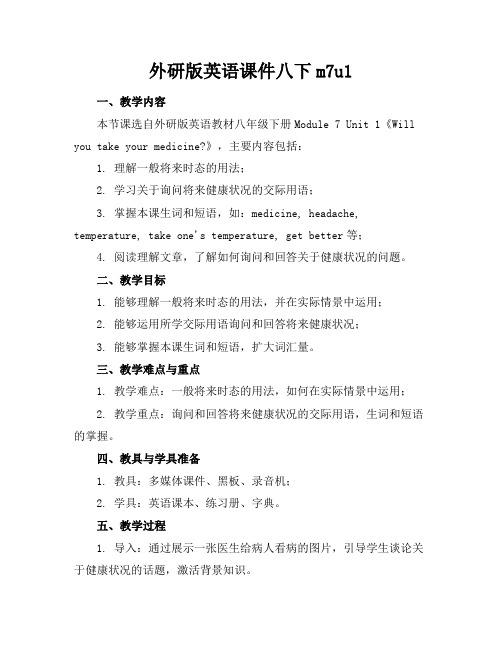
外研版英语课件八下m7u1一、教学内容本节课选自外研版英语教材八年级下册Module 7 Unit 1《Will you take your medicine?》,主要内容包括:1. 理解一般将来时态的用法;2. 学习关于询问将来健康状况的交际用语;3. 掌握本课生词和短语,如:medicine, headache, temperature, take one's temperature, get better等;4. 阅读理解文章,了解如何询问和回答关于健康状况的问题。
二、教学目标1. 能够理解一般将来时态的用法,并在实际情景中运用;2. 能够运用所学交际用语询问和回答将来健康状况;3. 能够掌握本课生词和短语,扩大词汇量。
三、教学难点与重点1. 教学难点:一般将来时态的用法,如何在实际情景中运用;2. 教学重点:询问和回答将来健康状况的交际用语,生词和短语的掌握。
四、教具与学具准备1. 教具:多媒体课件、黑板、录音机;2. 学具:英语课本、练习册、字典。
五、教学过程1. 导入:通过展示一张医生给病人看病的图片,引导学生谈论关于健康状况的话题,激活背景知识。
2. 新课内容展示:展示课件,讲解一般将来时态的用法,引导学生学习询问将来健康状况的交际用语。
3. 例题讲解:讲解教材中的例句,分析语法结构和用法,帮助学生理解和掌握。
4. 随堂练习:设计一些关于一般将来时态和询问将来健康状况的练习题,让学生独立完成,并及时给予反馈。
5. 小组活动:学生分成小组,用所学交际用语进行角色扮演,模拟医生和病人的对话。
六、板书设计1. 一般将来时态的用法;2. 询问将来健康状况的交际用语;3. 本课生词和短语。
七、作业设计1. 作业题目:(1)根据所给情景,用一般将来时态完成句子;(2)编写一段关于询问将来健康状况的对话。
2. 答案:(1)I will go to the doctor tomorrow.(我将明天去看医生。
外研版八下英语M7U1
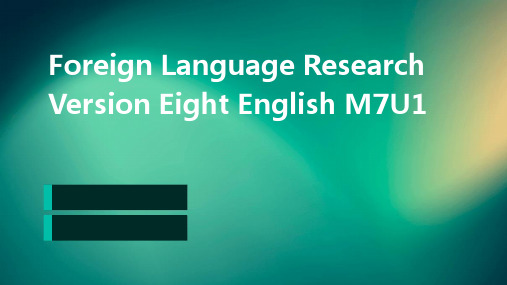
Examples and Applications of Common Phrases
• Cultural exchange: This phrase refers to the process of sharing and exchanging cultural practices, values, and beliefs between different groups or individuals It is often used in the context of discussing the benefits of learning foreign languages and the importance of cultural understanding
• Language barrier: This phrase refers to the differences or misunderstandings that arise when people speak different languages try to communicate with each other It is commonly used to highlight the challenges of cross cultural communication and the importance of translation and interpretation services
Authenticity
Materials should reflect real life situations and authentic language use to enhance learners' understanding and application of the target language
新外研版英语八年级下册M7U1课件
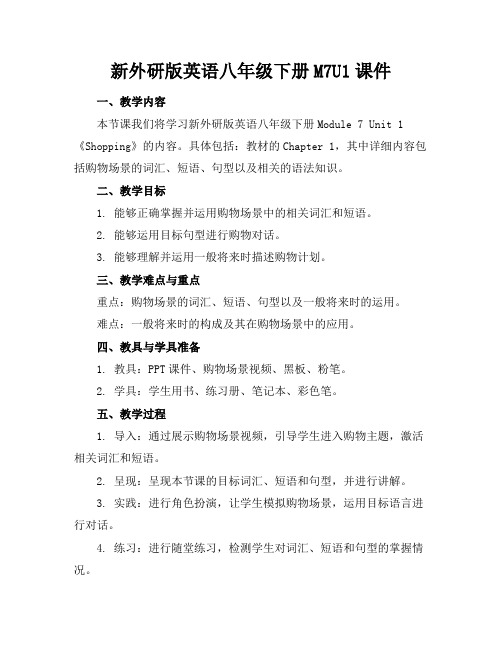
新外研版英语八年级下册M7U1课件一、教学内容本节课我们将学习新外研版英语八年级下册Module 7 Unit 1《Shopping》的内容。
具体包括:教材的Chapter 1,其中详细内容包括购物场景的词汇、短语、句型以及相关的语法知识。
二、教学目标1. 能够正确掌握并运用购物场景中的相关词汇和短语。
2. 能够运用目标句型进行购物对话。
3. 能够理解并运用一般将来时描述购物计划。
三、教学难点与重点重点:购物场景的词汇、短语、句型以及一般将来时的运用。
难点:一般将来时的构成及其在购物场景中的应用。
四、教具与学具准备1. 教具:PPT课件、购物场景视频、黑板、粉笔。
2. 学具:学生用书、练习册、笔记本、彩色笔。
五、教学过程1. 导入:通过展示购物场景视频,引导学生进入购物主题,激活相关词汇和短语。
2. 呈现:呈现本节课的目标词汇、短语和句型,并进行讲解。
3. 实践:进行角色扮演,让学生模拟购物场景,运用目标语言进行对话。
4. 练习:进行随堂练习,检测学生对词汇、短语和句型的掌握情况。
5. 解析:针对随堂练习中的问题进行解析,巩固所学知识。
6. 作业布置:布置课后作业,强化学生对购物场景的运用。
六、板书设计1. Module 7 Unit 1 Shopping2. 词汇:衣物类、颜色类、价格类等词汇。
3. 短语:询问价格、讨价还价、结账等短语。
4. 句型:一般将来时的句子结构。
七、作业设计1. 作业题目:(1)根据所给词汇,编写一段购物对话。
(2)用一般将来时描述你的下一个购物计划。
答案:(1)A: Excuse me, how much is this dress?B: It's 200 yuan, but we can give you a discount.A: OK, I'll take it.(2)I will buy a new pair of shoes next week.八、课后反思及拓展延伸1. 反思:本节课通过购物场景的引入,激发了学生的学习兴趣,使他们在实际语境中掌握了目标词汇、短语和句型。
外研版八年级下册英语M7U1教学课件3
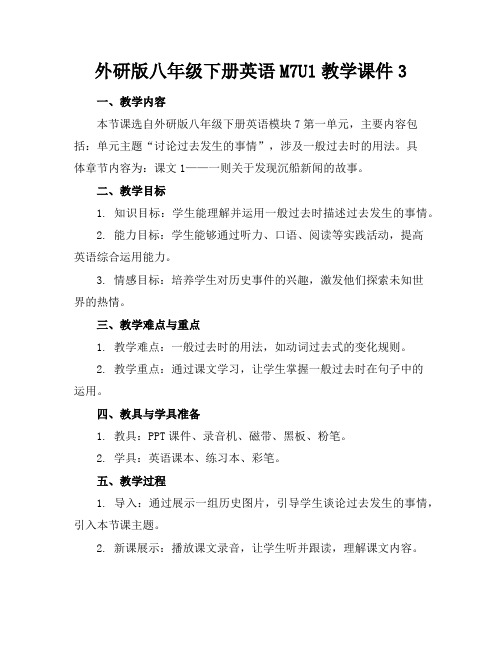
外研版八年级下册英语M7U1教学课件3一、教学内容本节课选自外研版八年级下册英语模块7第一单元,主要内容包括:单元主题“讨论过去发生的事情”,涉及一般过去时的用法。
具体章节内容为:课文1——一则关于发现沉船新闻的故事。
二、教学目标1. 知识目标:学生能理解并运用一般过去时描述过去发生的事情。
2. 能力目标:学生能够通过听力、口语、阅读等实践活动,提高英语综合运用能力。
3. 情感目标:培养学生对历史事件的兴趣,激发他们探索未知世界的热情。
三、教学难点与重点1. 教学难点:一般过去时的用法,如动词过去式的变化规则。
2. 教学重点:通过课文学习,让学生掌握一般过去时在句子中的运用。
四、教具与学具准备1. 教具:PPT课件、录音机、磁带、黑板、粉笔。
2. 学具:英语课本、练习本、彩笔。
五、教学过程1. 导入:通过展示一组历史图片,引导学生谈论过去发生的事情,引入本节课主题。
2. 新课展示:播放课文录音,让学生听并跟读,理解课文内容。
3. 例题讲解:结合课文,讲解一般过去时的用法,进行动词过去式的变化规则练习。
4. 随堂练习:设计一些关于一般过去时的练习题,让学生当堂完成,并及时给予反馈。
5. 口语活动:分组让学生用一般过去时讨论过去发生的事情,提高口语表达能力。
六、板书设计1. 黑板左侧:列出一般过去时的结构,标注动词过去式的变化规则。
2. 黑板右侧:展示课文中的重点句子,用不同颜色的粉笔标注一般过去时的用法。
七、作业设计1. 作业题目:请用一般过去时描述一下你上个周末做了哪些事情。
2. 答案示例:Last weekend, I visited my grandparents. We cooked together and watched a movie.八、课后反思及拓展延伸1. 课后反思:关注学生对一般过去时的掌握程度,针对学生存在的问题,调整教学方法,提高教学效果。
2. 拓展延伸:鼓励学生在课后阅读一些关于历史事件的文章,进一步了解一般过去时的用法。
外研版八下英语M7U1课件
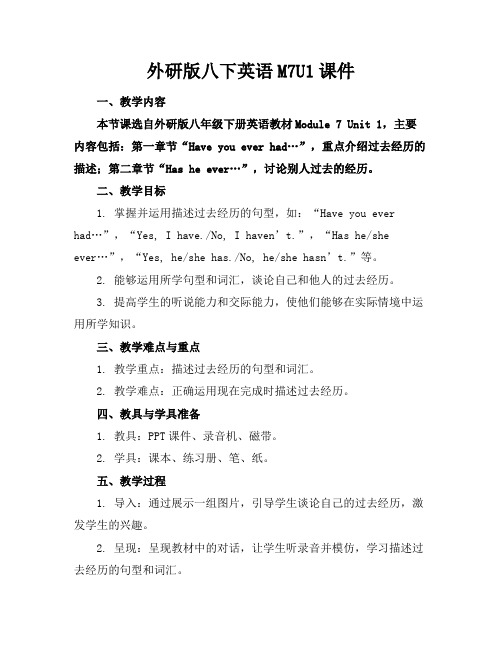
外研版八下英语M7U1课件一、教学内容本节课选自外研版八年级下册英语教材Module 7 Unit 1,主要内容包括:第一章节“Have you ever had…”,重点介绍过去经历的描述;第二章节“Has he ever…”,讨论别人过去的经历。
二、教学目标1. 掌握并运用描述过去经历的句型,如:“Have you ever had…”,“Yes, I have./No, I haven’t.”,“Has he/she ever…”,“Yes, he/she has./No, he/she hasn’t.”等。
2. 能够运用所学句型和词汇,谈论自己和他人的过去经历。
3. 提高学生的听说能力和交际能力,使他们能够在实际情境中运用所学知识。
三、教学难点与重点1. 教学重点:描述过去经历的句型和词汇。
2. 教学难点:正确运用现在完成时描述过去经历。
四、教具与学具准备1. 教具:PPT课件、录音机、磁带。
2. 学具:课本、练习册、笔、纸。
五、教学过程1. 导入:通过展示一组图片,引导学生谈论自己的过去经历,激发学生的兴趣。
2. 呈现:呈现教材中的对话,让学生听录音并模仿,学习描述过去经历的句型和词汇。
3. 实践:分小组进行角色扮演,用所学句型和词汇描述自己和他人的过去经历。
4. 互动:学生上台展示,老师和同学给予评价和反馈。
5. 巩固:进行随堂练习,检测学生对本节课内容的掌握程度。
六、板书设计1. Module 7 Unit 1 Have you ever had…?2. 句型:Have you ever had…?Yes, I have./No, I haven’t.Has he/she ever…?Yes, he/she has./No, he/she hasn’t.3. 词汇:had, ever, experience, interesting, exciting, boring, frightening, dangerous, safe七、作业设计1. 作业题目:(1)用所给句型和词汇,写一篇短文描述你和你朋友的过去经历。
外研版英语八下M7U1课件

外研版英语八下M7U1课件一、教学内容二、教学目标1. 了解并掌握关于未来交通工具的词汇和表达方式。
2. 能够运用一般将来时描述未来的交通工具和旅行方式。
3. 提高学生的听说读写能力,培养他们的合作意识和创新思维。
三、教学难点与重点教学难点:一般将来时的运用,对未来交通工具的预测。
教学重点:词汇、短语的学习,如:solarpowered、submarine train、 the end of等。
四、教具与学具准备1. 教具:多媒体课件、黑板、粉笔。
2. 学具:教材、笔记本、彩色笔。
五、教学过程1. 导入:通过展示一组关于未来交通工具的图片,激发学生的好奇心和兴趣,引导他们讨论未来的旅行方式。
2. 新课展示:展示课件,讲解1.1 The Future of Transportation部分,学习相关词汇和表达方式。
3. 例题讲解:以 1.2 Fast Train为例,讲解一般将来时的用法,引导学生用一般将来时描述未来高速铁路的发展。
4. 随堂练习:让学生分组讨论 1.3 The Future of Travel部分,用一般将来时预测未来的旅行方式。
5. 小组展示:每组选一名代表进行展示,其他同学认真听并给予评价。
六、板书设计1. Module 7 Unit 1 The Future of Transportation2. 主要内容:词汇:solarpowered、submarine train、 the end of等句型:will be used、is expected to do、 the end of等一般将来时的用法七、作业设计1. 作业题目:Write a short passage about the future of transportation in China.2. 答案要求:使用一般将来时,包含至少三个本节课所学的词汇。
八、课后反思及拓展延伸1. 反思:关注学生在课堂上的参与度,了解他们对一般将来时和词汇的掌握情况,及时调整教学方法。
2015新外研版八年级下册M7U.ppt

family Hollywood shopping
Listen to the passage and choose the best answer.
The passage is a _______________. a) a guide to Los Angeles b) information about English courses c) a story of life in Los Angeles d) a newspaper story about language
(with sb.) 系 prefer v. 更喜爱;钟爱 certain adj. 确定的;无疑的 fill v. 填满;填充 fill out 填写;填充
Los Angeles
Work in pairs. Look at the photos and say what you can see.
certain culture depend on fill out friendship guest progress provide test
Come and study in Los Angeles! You are (1) _c_e_r_ta_i_n_ to learn a lot from the course and understand more about American (2) _c_u_l_tu_r_e__.
form a friendship with sb. 表示“和某人建立友 谊”。例如:
Did you form a close friendship with anyone in your school? 你在学校有没有关系很密切的朋友? form v. 表示“形成,成为”。
- 1、下载文档前请自行甄别文档内容的完整性,平台不提供额外的编辑、内容补充、找答案等附加服务。
- 2、"仅部分预览"的文档,不可在线预览部分如存在完整性等问题,可反馈申请退款(可完整预览的文档不适用该条件!)。
- 3、如文档侵犯您的权益,请联系客服反馈,我们会尽快为您处理(人工客服工作时间:9:00-18:30)。
Betty: Shorts are good, or you can wear light
trousers. It’ll be sunny and hot there.
Lingling: I haven’t got any sunglasses. I’ll buy
Language points
1.Lingling and I are doing an English course in LA this summer! 今年夏天玲玲和我将要在 洛杉矶学习英语课程。 本句是一个现在进行时表达将来含义的句子。 有些动词如 go, come, leave等,可以用现在 进行时表将来。如: I’m going. 我要走了。 When are you leaving for Beijing? 你打算什么时候离开去北京? Please be quiet! The teacher is coming.
go crasy 发疯、欣喜若狂
crazy list passport shorts total trousers weigh weight
If you travel by plane, your bag cannot (5) _____ weigh too much. For some flights, twenty total you can take. To kilos may be the (6) _____ make sure, ask the travel company for help. weight of your Remember to check the (7) ______ bag. And finally, the most important thing: do not forget to take your (8) ________! passport
7
Unit 1 Please write to me and send me some photos!
LA
1. How do you spend your summer
holidays? 2. Have you ever been in any summer courses or summer camps?
Betty: Your bag mustn’t weigh too much. You’d better ask the travel company about the total weight for all your bags. Oh, by the way, don’t forget to take your passport. Lingling: OK. Thank you. Betty: You’re welcome. You’ll have a great time. Please write to me and send me some photos! Lingling: Yes, I will.
柯达影院
好莱坞,迪斯尼乐园, 比弗利山庄,圣塔莫妮卡海滩等 洛杉矶国际机场等
Do you want to go to LA ? If you want to go there to experience the manners and customs better, homestay will be a good choice.
Do you like travelling?
Do you want to travel during the summer holiday?
Do you want to have a trip in America?
Do you know Los Angeles? How much do you know about it?
What will you take for a trip?
clothes and money
passport n. 护照
What must you take if you go to another country?
list n. ney
crazy adj. 发疯的,荒唐的
1 dollars √ 2 shorts √ 3 Jeans
4 T-shirts 7 passport √ 5 pens √ 8 sunglasses 6 a dictionary√ 9 notebooks √
Read Part 2 and mark T (True) or F (false). 1. Lingling is leaving at the end of June. ( F) 2. Lingling is going to stay in China. ( F) 3. Betty’s going to stay in LA for four weeks. ( F) 4. It’s sunny and hot in LA in July. T ( ) 5. Betty wants Lingling to write to her and send her some photos. ( T)
total adj. 总的,全 部的
weight n. 重量
passport n. 护照
1 Where Daming and Linging are going: _______________________ They are going to LA. 2 What they are going to do: _________________________________ They are going to do an English course. 3 How long they will stay: ____________________________ They’ll stay for about four weeks. 4 How many students there are in the group: They _________________________ are going in a group of 20.
crazy list passport shorts total trousers weigh weight
When you are planning a trip, make a (1) ____ list of things to take. Do not go (2) ______ crazy and take too many clothes. For warm countries you can keep cool with (3) ______ shorts and some light(4) trousers _______.
5. If you’ve already paid for the air tickets and for homestay, it should be OK. pay for “支付…的费用, 为……付款”。 e.g. My father paid for my driving lessons. 我爸爸支付了我学车的费用。 homestay 指吃住在当地人家里,实际体 验当地人的生活。
6. Oh, by the way, don’t forget to take your passport. by the way “顺便说一下”,用于转换话题。 e.g. By the way, why not drop in for a drink? 顺便问一句,今晚来我家喝一杯怎么样?
don’t forget to do sth. “不要忘记做某事”。 等于remember to do sth. e.g. Don’t forget to take your homework when you go to school tomorrow.
a pair there.
Betty: That’s a good idea. But remember, many things are more expensive in America. Have you got any American dollars? Lingling: Yes. Is 200 dollars enough? Betty: If you’ve already paid for the air tickets and for homestay, it should be OK. Lingling: What else?
4. Is 200 dollars enough? 200美元够吗? 表示金钱、时间、重量或路程的名词做主语时, 表示一个整体概念,谓语动词用单数形式。 Three months has passed since you left. 自从你离开已经过去三个月了。 Ten kilometres is not so far. 10公里不算远。
• Can you help me? • How can I help? • Well, it sounds crazy, but… • By the way, ...
1. I’m making a list of things for my trip. 我正在列一张旅行所需的清单。 make a list 意为“制表;列单”。 list的意思是“清单;表”,常见的搭配有: a book list 书单,a price list 价目表, a table list 课程表,a name list 名单。如: Make a list of your favourite food. Here is the shopping list.
1. Where is Linging going? Los Angeles. 2. Are many things more expensive in America? Yes, they are.
